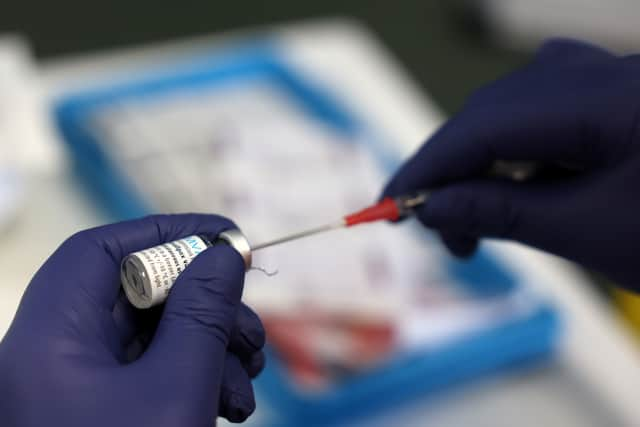Monkeypox to be renamed ‘mpox’ after WHO claim racist remarks have been made about disease
and live on Freeview channel 276
The World Health Organisation (WHO) has confirmed that monkeypox will be renamed ‘mpox’ after claiming that racist remarks have been used in relation to the disease. Global experts at the WHO have said that both names will be used for the disease simultaneously for one year while “monkeypox” is phased out in a bid to minimise stigmatisation of the illness.
The WHO said when the outbreak of monkeypox expanded earlier this year, racist and stigmatising language online, in other settings and in some communities was observed and reported to the WHO. In several meetings, public and private, several individuals and countries raised concerns and asked WHO to propose a way forward to change the name.
Advertisement
Hide AdAdvertisement
Hide AdAssigning names to new and, very exceptionally, to existing diseases is the responsibility of WHO under the International Classification of Diseases (ICD) and the WHO Family of International Health-Related Classifications through a consultative process which includes WHO Member States.
However, name changes of diseases can often take years, but the WHO has accelerated the process by holding consultations to gather views from a range of experts, as well as countries and the general public, who were invited to submit suggestions for new names.


Based on these consultations, and further discussions with WHO’s Director-General Dr Tedros Adhanom Ghebreyesus, WHO recommends the following:
- Adoption of the new synonym mpox in English for the disease.
- Mpox will become a preferred term, replacing monkeypox, after a transition period of one year. This serves to mitigate the concerns raised by experts about the confusion caused by a name change amid a global outbreak. It also gives time to complete the ICD update process and to update WHO publications.
- The synonym mpox will be included in the ICD-10 online in the coming days. It will be a part of the official 2023 release of ICD-11, which is the current global standard for health data, clinical documentation and statistical aggregation.
- The term “monkeypox” will remain a searchable term in ICD, to match historic information.
Considerations for the recommendations included rationale, scientific appropriateness, the extent of current usage, pronounceability, usability in different languages, absence of geographical or zoological references, and the ease of retrieval of historical scientific information.
Advertisement
Hide AdAdvertisement
Hide AdVarious advisory bodies were also heard during the consultation process, including experts from the medical and scientific and classification and statistics advisory committees which constituted representatives from government authorities of 45 different countries.
WHO will adopt the term ‘mpox’ in its communications, and encourages others to follow these recommendations, to minimise any ongoing negative impact of the current name and from the adoption of the new name.
What is Monkeypox?
According to the NHS website, Monkeypox is a rare infection most commonly found in west or central Africa. There has recently been an increase in cases in the UK, but the risk of catching it is low. Although more people have been diagnosed with it recently, only a small number of people in the UK have had monkeypox and the risk remains low.
How you get Monkeypox
Monkeypox can be passed on from person to person through:
- any close physical contact with monkeypox blisters or scabs (including during sexual contact, kissing, cuddling or holding hands)
- touching clothing, bedding or towels used by someone with monkeypox
- the coughs or sneezes of a person with monkeypox when they’re close to you
In parts of west and central Africa, monkeypox can also be caught from infected rodents such as rats, mice and squirrels.
Symptoms of Monkeypox
Advertisement
Hide AdAdvertisement
Hide AdIf you get infected with monkeypox, it usually takes between 5 and 21 days for the first symptoms to appear.
The first symptoms of monkeypox include:
- a high temperature
- a headache
- muscle aches
- backache
- swollen glands
- shivering (chills)
- exhaustion
- joint pain
A rash usually appears 1 to 5 days after the first symptoms. The rash often begins on the face, and then spreads to other parts of the body. This can include the mouth, genitals and anus.
You may also have anal pain or bleeding from your bottom.
The symptoms usually clear up in a few weeks. While you have symptoms, you can pass monkeypox on to other people.
